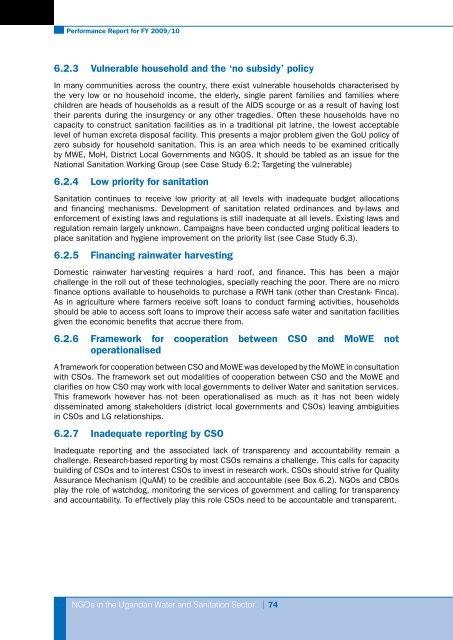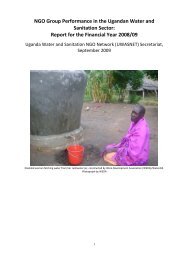Performance Report for FY 2009/10 - UWASNET
Performance Report for FY 2009/10 - UWASNET
Performance Report for FY 2009/10 - UWASNET
You also want an ePaper? Increase the reach of your titles
YUMPU automatically turns print PDFs into web optimized ePapers that Google loves.
<strong>Per<strong>for</strong>mance</strong> <strong>Report</strong> <strong>for</strong> <strong>FY</strong> <strong>2009</strong>/<strong>10</strong><br />
6.2.3 Vulnerable household and the ‘no subsidy’ policy<br />
In many communities across the country, there exist vulnerable households characterised by<br />
the very low or no household income, the elderly, single parent families and families where<br />
children are heads of households as a result of the AIDS scourge or as a result of having lost<br />
their parents during the insurgency or any other tragedies. Often these households have no<br />
capacity to construct sanitation facilities as in a traditional pit latrine, the lowest acceptable<br />
level of human excreta disposal facility. This presents a major problem given the GoU policy of<br />
zero subsidy <strong>for</strong> household sanitation. This is an area which needs to be examined critically<br />
by MWE, MoH, District Local Governments and NGOS. It should be tabled as an issue <strong>for</strong> the<br />
National Sanitation Working Group (see Case Study 6.2; Targeting the vulnerable)<br />
6.2.4 Low priority <strong>for</strong> sanitation<br />
Sanitation continues to receive low priority at all levels with inadequate budget allocations<br />
and financing mechanisms. Development of sanitation related ordinances and by-laws and<br />
en<strong>for</strong>cement of existing laws and regulations is still inadequate at all levels. Existing laws and<br />
regulation remain largely unknown. Campaigns have been conducted urging political leaders to<br />
place sanitation and hygiene improvement on the priority list (see Case Study 6.3).<br />
6.2.5 Financing rainwater harvesting<br />
Domestic rainwater harvesting requires a hard roof, and finance. This has been a major<br />
challenge in the roll out of these technologies, specially reaching the poor. There are no micro<br />
finance options available to households to purchase a RWH tank (other than Crestank- Finca).<br />
As in agriculture where farmers receive soft loans to conduct farming activities, households<br />
should be able to access soft loans to improve their access safe water and sanitation facilities<br />
given the economic benefits that accrue there from.<br />
6.2.6 Framework <strong>for</strong> cooperation between CSO and MoWE not<br />
operationalised<br />
A framework <strong>for</strong> cooperation between CSO and MoWE was developed by the MoWE in consultation<br />
with CSOs. The framework set out modalities of cooperation between CSO and the MoWE and<br />
clarifies on how CSO may work with local governments to deliver Water and sanitation services.<br />
This framework however has not been operationalised as much as it has not been widely<br />
disseminated among stakeholders (district local governments and CSOs) leaving ambiguities<br />
in CSOs and LG relationships.<br />
6.2.7 Inadequate reporting by CSO<br />
Inadequate reporting and the associated lack of transparency and accountability remain a<br />
challenge. Research-based reporting by most CSOs remains a challenge. This calls <strong>for</strong> capacity<br />
building of CSOs and to interest CSOs to invest in research work. CSOs should strive <strong>for</strong> Quality<br />
Assurance Mechanism (QuAM) to be credible and accountable (see Box 6.2). NGOs and CBOs<br />
play the role of watchdog, monitoring the services of government and calling <strong>for</strong> transparency<br />
and accountability. To effectively play this role CSOs need to be accountable and transparent.<br />
NGOs in the Ugandan Water and Sanitation Sector | 74



